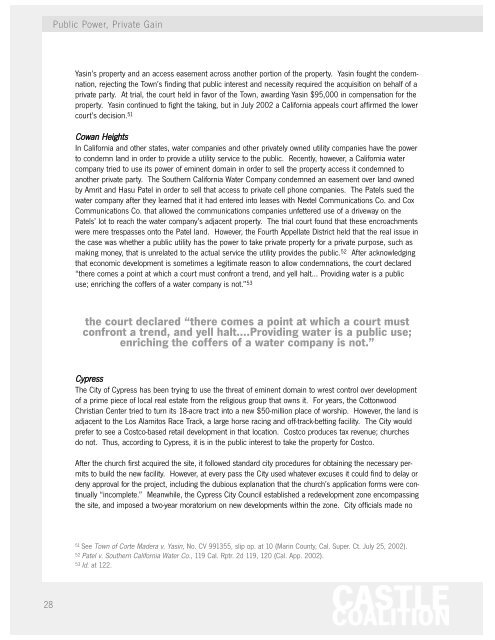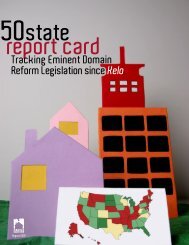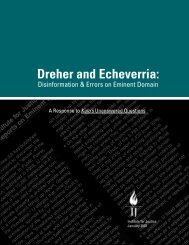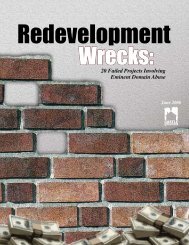Public Power, Private Gain - The Castle Coalition
Public Power, Private Gain - The Castle Coalition
Public Power, Private Gain - The Castle Coalition
Create successful ePaper yourself
Turn your PDF publications into a flip-book with our unique Google optimized e-Paper software.
<strong>Public</strong> <strong>Power</strong>, <strong>Private</strong> <strong>Gain</strong>Yasin’s property and an access easement across another portion of the property. Yasin fought the condemnation,rejecting the Town’s finding that public interest and necessity required the acquisition on behalf of aprivate party. At trial, the court held in favor of the Town, awarding Yasin $95,000 in compensation for theproperty. Yasin continued to fight the taking, but in July 2002 a California appeals court affirmed the lowercourt’s decision. 51Cowan HeightsIn California and other states, water companies and other privately owned utility companies have the powerto condemn land in order to provide a utility service to the public. Recently, however, a California watercompany tried to use its power of eminent domain in order to sell the property access it condemned toanother private party. <strong>The</strong> Southern California Water Company condemned an easement over land ownedby Amrit and Hasu Patel in order to sell that access to private cell phone companies. <strong>The</strong> Patels sued thewater company after they learned that it had entered into leases with Nextel Communications Co. and CoxCommunications Co. that allowed the communications companies unfettered use of a driveway on thePatels’ lot to reach the water company’s adjacent property. <strong>The</strong> trial court found that these encroachmentswere mere trespasses onto the Patel land. However, the Fourth Appellate District held that the real issue inthe case was whether a public utility has the power to take private property for a private purpose, such asmaking money, that is unrelated to the actual service the utility provides the public. 52 After acknowledgingthat economic development is sometimes a legitimate reason to allow condemnations, the court declared“there comes a point at which a court must confront a trend, and yell halt… Providing water is a publicuse; enriching the coffers of a water company is not.” 53the court declared “there comes a point at which a court mustconfront a trend, and yell halt….Providing water is a public use;enriching the coffers of a water company is not.”Cypress<strong>The</strong> City of Cypress has been trying to use the threat of eminent domain to wrest control over developmentof a prime piece of local real estate from the religious group that owns it. For years, the CottonwoodChristian Center tried to turn its 18-acre tract into a new $50-million place of worship. However, the land isadjacent to the Los Alamitos Race Track, a large horse racing and off-track-betting facility. <strong>The</strong> City wouldprefer to see a Costco-based retail development in that location. Costco produces tax revenue; churchesdo not. Thus, according to Cypress, it is in the public interest to take the property for Costco.After the church first acquired the site, it followed standard city procedures for obtaining the necessary permitsto build the new facility. However, at every pass the City used whatever excuses it could find to delay ordeny approval for the project, including the dubious explanation that the church’s application forms were continually“incomplete.” Meanwhile, the Cypress City Council established a redevelopment zone encompassingthe site, and imposed a two-year moratorium on new developments within the zone. City officials made no51 See Town of Corte Madera v. Yasin, No. CV 991355, slip op. at 10 (Marin County, Cal. Super. Ct. July 25, 2002).52 Patel v. Southern California Water Co., 119 Cal. Rptr. 2d 119, 120 (Cal. App. 2002).53 Id. at 122.28





